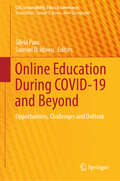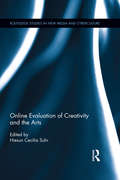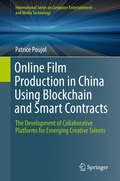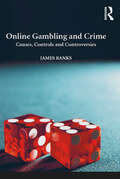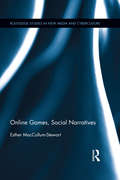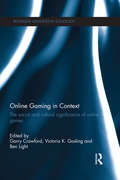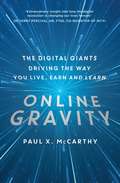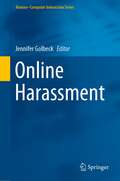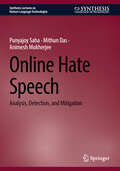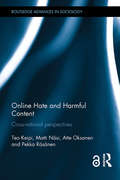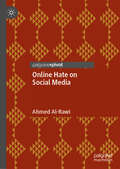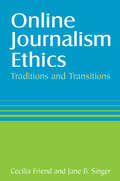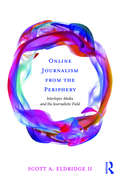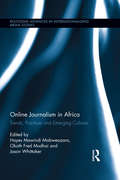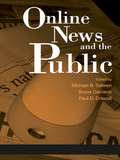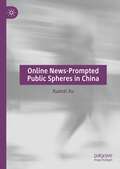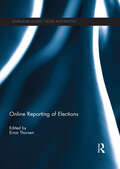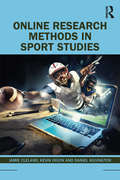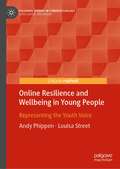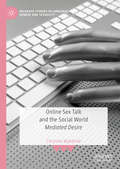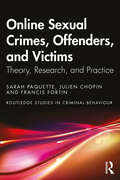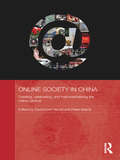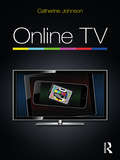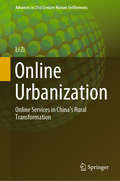- Table View
- List View
Online Education During COVID-19 and Beyond: Opportunities, Challenges and Outlook (CSR, Sustainability, Ethics & Governance)
by Samuel O. Idowu Silvia PuiuThis book aims to provide sustainable solutions for better understanding and management of online education in different parts of the world. In this context, it explores the attitudes and perceptions of stakeholders, such as students, faculty, and other actors on issues related to online education. In particular, it examines the challenges they have faced over the years when online courses were introduced due to the COVID-19 pandemic. A model is proposed that includes five variables: specific communication issues in online education, the ability of professors to offer online courses, the quality of online education, students' perceived stress during online education, and the technical requirements of online education.The book will be of interest to anyone concerned with the new and future ways of teaching and learning.Chapter “When a Phenomenon-Based University Course Went Online: Students’ Experiences and Reflections After Sauna Bathing” is available open access under a Creative Commons Attribution 4.0 International License via link.springer.com.
Online Evaluation of Creativity and the Arts (Routledge Studies in New Media and Cyberculture)
by Hiesun Cecilia SuhrSocial media have dramatically popularized practices of evaluation, especially of cultural products and artistic expressions. The practices of "liking" and rating any shared contents such as music to blogs, film, videos, photographs to artwork and performances are ubiquitous in today’s digital environments. As a result, creative producers are increasingly developing reputations and careers through a complex blend of online social reputation management and distribution platforms, and more longstanding forms of marketing channels and professional evaluation. In this context, Online Evaluation of Creativity and the Arts seeks to examine the newly emerging forms of evaluation, such as contests, competitions, ranking, commenting, liking, and rating, which are taking place in digital environments. In doing so, this book investigates the criteria and assessment practices tied to the evaluation of creativity and artistic works and further questions what is at stake when digital environments heighten the role of amateur and peer criticism to the level of expert critiques. While exploring potential informal learning opportunities and offering incisive critiques on the emerging norms and standards of evaluation, the essays in this book cover a wide range of artistic and creative practices.
Online Film Production in China Using Blockchain and Smart Contracts: The Development of Collaborative Platforms for Emerging Creative Talents (International Series on Computer Entertainment and Media Technology)
by Patrice PoujolThis book explores the use of Blockchain and smart contract technologies to develop new ways to finance independent films and digital media worldwide. Using case studies of Alibaba and in-depth, on-set observation of a Sino-US coproduction, as well as research collected from urban China, Hong Kong, Europe, and the USA, Online Film Production in China Using Blockchain and Smart Contracts explores new digital platforms and what this means for the international production of creative works. This research assesses the change in media consciousness from young urban audiences, their emergence as a potential participative and creative community within dis-intermediated, decentralised and distributed crowdfunding and crowdsourcing models. This research proposes solutions on how these young emerging local creative talents can be identified and nurtured early on, particularly those who now produce creative and artistic audiovisual content whether these works are related to film, Virtual Reality (VR), video game, graphic novels, or music. Ultimately, a new media content finance and production platform implementing blockchain is proposed to bring transparency in the film sector and open doors to emerging artists in digital media. Appropriate for both professionals and academics in the film industry as well as computer science.
Online Gambling and Crime: Causes, Controls and Controversies
by James BanksOffering the first empirically driven assessment of the development, marketisation, regulation and use of online gambling organisations and their products, this book explores the relationship between online gambling and crime. It draws upon quantitative and qualitative data, including textual and visual analyses of e-gambling advertising and the records of player-protection and standards organisations, together with a virtual ethnography of online gambling subcultures, to examine the ways in which gambling and crime have been approached in practice by gamers, regulatory agencies and online gambling organisations. Building upon contemporary criminological theory, it develops an understanding of online gambling as an arena in which risks and rewards are carefully constructed and through which players navigate, employing their own agency to engage with the very real possibility of victimisation. With attention to the manner in which online gambling can be a source of criminal activity, not only on the part of players, but also criminal entrepreneurs and legitimate gambling businesses, Online Gambling and Crime discusses developments in criminal law and regulatory frameworks, evaluating past and present policy on online gambling. A rich examination of the prevalence, incidence and experience of a range of criminal activities linked to gambling on the Internet, this book will appeal to scholars and policy makers in the fields of sociology and criminology, law, the study of culture and subculture, risk, health studies and social policy.
Online Games, Social Narratives: Online Games, Social Narratives (Routledge Studies in New Media and Cyberculture)
by Esther MacCallum-StewartThe study of online gaming is changing. It is no longer enough to analyse one type of online community in order to understand the plethora of players who take part in online worlds and the behaviours they exhibit. MacCallum-Stewart studies the different ways in which online games create social environments and how players choose to interpret these. These games vary from the immensely popular social networking games on Facebook such as Farmville to Massively Multiplayer Online Roleplaying Games to "Free to Play" online gaming and console communities such as players of Xbox Live and PS3 games. Each chapter deals with a different aspect of social gaming online, breaking down when games are social and what narrative devices make them so. This cross-disciplinary study will appeal to those interested in cyberculture, the evolution of gaming technology, and sociologies of media.
Online Gaming in Context: The social and cultural significance of online games (Routledge Advances in Sociology)
by Garry Crawford Ben Light Victoria K. GoslingThere is little question of the social, cultural and economic importance of video games in the world today, with gaming now rivalling the movie and music sectors as a major leisure industry and pastime. The significance of video games within our everyday lives has certainly been increased and shaped by new technologies and gaming patterns, including the rise of home-based games consoles, advances in mobile telephone technology, the rise in more 'sociable' forms of gaming, and of course the advent of the Internet. This book explores the opportunities, challenges and patterns of gameplay and sociality afforded by the Internet and online gaming. Bringing together a series of original essays from both leading and emerging academics in the field of game studies, many of which employ new empirical work and innovative theoretical approaches to gaming, this book considers key issues crucial to our understanding of online gaming and associated social relations, including: patterns of play, legal and copyright issues, player production, identity construction, gamer communities, communication, patterns of social exclusion and inclusion around religion, gender and disability, and future directions in online gaming.
Online Gravity
by Paul X. MccarthyWhy has your video shop been replaced with Netflix? Why is your holiday now booked via Airbnb? Why is your taxi driver from Uber? And why is there no Pepsi in cyberspace? We are all under the influence of Online Gravity, the powerful force driving the digital economy. Online Gravity forms huge planet-like companies that eat up or blitz their competition, and it's changing the face of business, work and leisure. In this fascinating book, Paul X. McCarthy, digital expert and big data analyst, shows that while the phenomenon is startling, it follows its own set of distinct rules and its power can be harnessed for our own success. McCarthy reveals the seven laws of Online Gravity that are shaping the new world of business and how they can help us and our kids as workers and business owners of the 21st Century. By revealing its inner workings, he shows how savvy digital start-ups have become giants of their realm, shifting where and what the jobs of the future look like. He also outlines new order business models, like Gazelles and Rocketships, Centurions and Unicorns, and modern worker identities, like Global Passionistas, Slashies and Uberslashies. But most importantly, he shows us how to hack the strategies of Gravity giants to turbo-charge our own business, work and play. A must-have guide to negotiating your future in an increasingly digital world 'A fantastic insight into how the digital revolution is changing our lives forever' --Dr Terry Percival AM, FTSE, co-inventor of wi-fi 'A fascinating insight into what makes a success of internet giants ... Novel and thought-provoking' -- Professor Maurice Pagnucco, Head of Computer Science and Engineering, University of NSW, Australia
Online Harassment (Human–Computer Interaction Series)
by Jennifer GolbeckOnline Harassment is one of the most serious problems in social media. To address it requires understanding the forms harassment takes, how it impacts the targets, who harasses, and how technology that stands between users and social media can stop harassers and protect users. The field of Human-Computer Interaction provides a unique set of tools to address this challenge. This book brings together experts in theory, socio-technical systems, network analysis, text analysis, and machine learning to present a broad set of analyses and applications that improve our understanding of the harassment problem and how to address it. This book tackles the problem of harassment by addressing it in three major domains. First, chapters explore how harassment manifests, including extensive analysis of the Gamer Gate incident, stylistic features of different types of harassment, how gender differences affect misogynistic harassment. Then, we look at the results of harassment, including how it drives people offline and the impacts it has on targets. Finally, we address techniques for mitigating harassment, both through automated detection and filtering and interface options that users control. Together, many branches of HCI come together to provide a comprehensive look at the phenomenon of online harassment and to advance the field toward effective human-oriented solutions.
Online Hate Speech: Analysis, Detection, and Mitigation (Synthesis Lectures on Human Language Technologies)
by Animesh Mukherjee Punyajoy Saha Mithun DasThis book informs readers on how to understand, detect, and mitigate hate speech in online social media. The authors first cover the definition of hate speech and how its prevalence can be measured on online social media platforms using text and graph-based methods. The book then describes the process of detecting hate speech and presents a comprehensive account of the AI models that are currently being used. Further, the authors discuss the associated challenges that must be overcome while using these models. The book concludes with an overview of the mitigation techniques for hate speech, including blocking or suspension of the accounts (hard technique) and counterspeech (soft technique), and a discussion of the effects of these techniques on social media platforms.
Online Hate and Harmful Content: Cross-National Perspectives (Routledge Advances in Sociology)
by Atte Oksanen Pekka Räsänen Teo Keipi Matti NäsiOver the past few decades, various types of hate material have caused increasing concern. Today, the scope of hate is wider than ever, as easy and often-anonymous access to an enormous amount of online content has opened the Internet up to both use and abuse. By providing possibilities for inexpensive and instantaneous access without ties to geographic location or a user identification system, the Internet has permitted hate groups and individuals espousing hate to transmit their ideas to a worldwide audience. Online Hate and Harmful Content focuses on the role of potentially harmful online content, particularly among young people. This focus is explored through two approaches: firstly, the commonality of online hate through cross-national survey statistics. This includes a discussion of the various implications of online hate for young people in terms of, for example, subjective wellbeing, trust, self-image and social relationships. Secondly, the book examines theoretical frameworks from the fields of sociology, social psychology and criminology that are useful for understanding online behaviour and online victimisation. Limitations of past theory are assessed and complemented with a novel theoretical model linking past work to the online environment as it exists today. An important and timely volume in this ever-changing digital age, this book is suitable for graduates and undergraduates interested in the fields of Internet and new media studies, social psychology and criminology. The analyses and findings of the book are also particularly relevant to practitioners and policy-makers working in the areas of Internet regulation, crime prevention, child protection and social work/youth work.
Online Hate on Social Media
by Ahmed Al-RawiThe book empirically investigates various tactics, approaches, and digital communities that play a role in the propagation of online hate on social media. I use a mixed method approach involving manual and automated analysis of social media data mostly taken from Twitter, Instagram, and Telegram. Though no book can be comprehensive enough, this manuscript offers the reader a modest understanding of the important aspects that negatively impact certain communities such as racialized groups and women. The quality of online hate becomes notably different at the intersection of these identities, especially when taking into account religion, ethnicity, gender, and race.
Online Interviewing
by Hugh Busher Nalita JamesOnline Interviewing is a short, accessible and highly practical introduction to designing and conducting online interviews in qualitative research. James and Busher focus on helping the reader to understand the methodological and epistemological challenges of carrying out online interviews in the virtual environment. They highlight the many new ethical issues that face researchers in this medium. The authors also encourage an engagement with the critical theoretical issues that must be considered in the conduct of online interviews. The resulting book is a well-reasoned introduction to the challenges and opportunities offered by online interviewing, drawing on a wide range of international sources to support these discussions. This is an ideal first introduction for anyone who is interested in using online methods, and who has an interest in the theory of the method. It will be an invaluable resource for undergraduate and postgraduate level students in the social sciences, and for professional researchers.
Online Journalism Ethics: Traditions and Transitions
by Cecilia Friend Jane SingerOnline media present both old and new ethical issues for journalists who must make decisions in an interactive, instantaneous environment short on normative standards or guidelines. This user-friendly book guides prospective and professional journalists through ethical questions encountered only online. Including real-life examples and perspectives from online journalists in every chapter, the book examines the issues of gathering information, reporting, interviewing, and writing for mainstream news organizations on the Web. It considers the ethical implications of linking, interactivity, verification, transparency, and Web advertising, as well as the effects of convergence on newsrooms. It also addresses the question of who is a journalist and what is journalism in an age when anyone can be a publisher. Each chapter includes a complex case study that promotes critical thinking and classroom discussion about how to apply the ethical issues covered.
Online Journalism from the Periphery: Interloper Media and the Journalistic Field
by Scott A. Eldridge IIOnline Journalism from the Periphery looks at how a range of new media actors, communicating online, have challenged us to think differently about the journalistic field. Emerging from the disruption of digital technology, these new actors have been met with resistance by an existing core of journalism, who perceive them as part of a ‘digital threat’ and dismiss their claims of journalistic belonging. As a result, cracks are appearing in the conceptual foundations of what journalism is and should be. Applying field theory as a conceptual lens, Scott Eldridge guides the reader through the intricacies of these tensions at both the core and periphery. By first unpacking definitions of journalism as a social and cultural construction, this book explores how these are dominated by narratives which have reinforced a limited set of expectations about its purpose and reach. The book goes on to examine how these narratives have been significantly undermined by the output of major new media players, including Gawker, reddit, Breitbart, and WikiLeaks. Online Journalism from the Periphery argues for a broadening of ideas around what constitutes journalism in the modern world, concluding with alternative approaches to evaluating the contributions of emerging media heavy-weights to society and to journalism.
Online Journalism in Africa: Trends, Practices and Emerging Cultures (Routledge Advances in Internationalizing Media Studies #12)
by Jason Whittaker Hayes Mawindi Mabweazara Okoth Fred MudhaiVery little is known about how African journalists are forging "new" ways to practise their profession on the web. Against this backdrop, this volume provides contextually rooted discussions of trends, practices, and emerging cultures of web-based journalism(s) across the continent, offering a comprehensive research tool that can both stand the test of time as well as offer researchers (particularly those in the economically developed Global North) models for cross-cultural comparative research. The essays here deploy either a wide range of evidence or adopt a case-study approach to engage with contemporary developments in African online journalism. This book thus makes up for the gap in cross-cultural studies that seek to understand online journalism in all its complexities.
Online News and the Public (Routledge Communication Series)
by Bruce Garrison Michael B. Salwen Paul D. DriscollThis volume offers unique and timely insights on the state of online news, exploring the issues surrounding this convergence of print and electronic platforms, and the public's response to it. It provides an overview of online newspapers, including current trends and legal issues and covering issues of credibility and perceptions by online news users.The heart of the book is formed by empirical studies-mostly social surveys-coming out of the media effects and uses traditions. The chapters are grounded in theoretical frameworks and bring much-needed theory to the study of online news. The frameworks guiding these studies include media credibility, the third-person effect, media displacement, and uses and gratifications. The book ends with a section devoted to research on online news postings.This book is appropriate for scholars, researchers, and students in journalism, mass communication, new media, and related areas, and will be of interest to anyone examining how people use the web as a source for news.
Online News-Prompted Public Spheres in China
by Xuanzi XuThis book argues that there are constant formations of online public spheres in present-day China, prompted by never-ending news. It contends that these publics are chronic, although individually they are usually transient. They are networked, which enables them to go viral in hours, and they may engender unexpected consequences. These features explain why online public spheres survive in China even though censorship and information manipulation are pervasively and strategically maneuvered to guide or manufacture “public opinion”. The book also proposes that there are deeply entangled structural factors bolstering China's online news-prompted public spheres: the continuous flow of news information, the countless public spaces facilitated by China’s digital infrastructure and the rise of rights-conscious netizens. Pushing forward a new way of conceptualizing the idea of public spheres, this book contends clearly that public spheres are most often sparked by chronic news in today's media-saturated societies. Delving into the life cycles of public spheres, it goes beyond static analysis of individual public spheres and instead studies their five qualities, which, except for the networked quality, have never been systematically addressed in scholarship.
Online Reporting of Elections (ISSN)
by Einar ThorsenThis book contributes to debates concerning online reporting of elections and the challenges facing journalism in the context of democratic change. The speed of technological adaptation by journalists and their audiences means online news is gradually becoming a normalised part of media landscapes across the world. Journalists monitor social media for insight into the political process and as an instant indication of "public sentiment", rather than waiting for press releases and opinion polls. Citizens are actively participating in online political reporting too, through publishing eyewitness accounts, political commentary, crowd-sourcing and fact-checking information (of political manifestos and media reports alike). It is therefore growing increasingly important to understand how political journalism is evolving through new communicative forms and practices, in order to critique its epistemological role and function in democratic societies, and examine how these interventions influence daily online political reporting across different national contexts.This volume covers comparative, research-based studies across a range of national contexts and electoral systems, including Australia, ten African countries, the European Union, Greece, the Netherlands, India, Iran, Sweden, the UK and the USA.This book was originally published as a special issue of Journalism Practice.
Online Research Methods in Sport Studies
by Jamie Cleland Kevin Dixon Daniel KilvingtonThe internet and digital technologies have transformed sport and the way that we research sport, opening up new ways to analyse sport organisations, fan communities, networks, athletes, the media, and other key stakeholders in the field. This engaging and innovative book offers a complete introduction to online research methods in sport studies, guiding the reader through the entire research process, and bringing that process to life with sport-related cases and examples. Covering both qualitative and quantitative methods, the book introduces key topics such as generating a research idea, implementing the research design, maintaining good ethical standards, and collecting, analysing and presenting data. It explains how to conduct online surveys, online interviews, and online ethnography in practice, and every chapter contains individual and group activities to encourage the reader to engage with real online research, as well as further reading suggestions to help them develop their knowledge. Online Research Methods in Sport Studies is essential reading for undergraduate and postgraduate students, academics, and researchers with an interest in sport studies, and is a useful reference for practitioners working in sport or sport media who want to improve their professional research skills.
Online Resilience and Wellbeing in Young People: Representing the Youth Voice (Palgrave Studies in Cyberpsychology)
by Andy Phippen Louisa StreetThis book explores online resilience and safety from a new perspective, by drawing extensively upon the youth voice. While “online safety” as a concept has now existed for well over ten years, the majority of policy and narrative is driven by preventative and adultist views of ensuring safety from harm. Underpinned by extensive empirical work, this book argues that safety, or freedom from harm, is not an achievable goal and we should refocus upon harm reduction and risk mitigation. Fundamental to this argument is that the youth voice clearly states that they will not disclose, or ask adults for support, because they do not believe they will get help or worse, will be punished as a result of disclosure. The research shows that professionals often bring their own digital value biases into safeguarding decisions, and feel that they should be white knights to young people, rather than listening to them and supporting them in a non-judgemental way. The book will be of great value to researchers and students as well as practitioners, teachers and parents interested in digital resilience and safeguarding, internet security and youth online behaviour and wellbeing.
Online Sex Talk and the Social World: Mediated Desire (Palgrave Studies in Language, Gender and Sexuality)
by Chrystie MyketiakThis book develops a feminist and queer linguistic account of the construction of sex, sexuality, and desire through a linguistic and discursive analysis of naturally occurring sex talk from an online community. Critical discourse analysis is used to analyse a corpus of data drawn from incidental sex 'talk' observed in the community over the course of an 18-month period. Sub-types of sex talk that are examined include cybersex, self-disclosure, confidences, joking, games, flirting, and automated sexual commands that ‘generate’ sex between participants. The book will be of use to students and researchers interested in the language of gender and sexuality, as well as feminist and queer accounts of technology and sexual communication.
Online Sexual Crimes, Offenders, and Victims: Theory, Research, and Practice (Routledge Studies in Criminal Behaviour)
by Julien Chopin Sarah Paquette Francis FortinAdopting a multidisciplinary perspective, this volume explores contemporary knowledge regarding the online sexual exploitation of children and adolescents, and challenges prevailing myths perpetuated by society and the media concerning this form of violence, the offenders, and their victims.Drawing on a wealth of data collected from real cases in Quebec, the book introduces readers to explanatory models of online offending and victimization, the criminal trajectories and characteristics of online offenses, the individual attributes of offenders and victims, issues pertaining to virtual identities and anonymity preservation techniques, and considerations for prevention and intervention practices.Online Sexual Crimes, Offenders, and Victims will be of interest to students, researchers, and professionals in the fields of criminal justice and public health, including criminologists, psychologists, psychiatrists, psychotherapists, social workers, police investigators, probation officers, magistrates, and lawyers.
Online Society in China: Creating, celebrating, and instrumentalising the online carnival (Media, Culture and Social Change in Asia)
by Peter Marolt David Kurt HeroldThis book discusses the rich and varied culture of China's online society, and its impact on offline China. It argues that the internet in China is a separate 'space' in which individuals and institutions emerge and interact. While offline and online spaces are connected and influence each other, the Chinese internet is more than merely a technological or media extension of offline Chinese society. Instead of following existing studies by locating online China in offline society, the contributors in this book discuss the carnival of the Chinese internet on its own terms. Examining the complex relationship between government officials and the people using the Internet in China, this book demonstrates that culture is highly influential in how technology is used. Discussing a wide range of different activities, the contributors examine what Chinese people actually do on the internet, and how their actions can be interpreted within the online society they are creating.
Online TV
by Catherine JohnsonWith growth in access to high-speed broadband and 4G, and increased ownership of smartphones, tablets and internet-connected television sets, the internet has simultaneously begun to compete with and transform television. Online TV argues that these changes create the conditions for an emergent internet era that challenges the language and concepts that we have to talk about television as a medium. In a wide-ranging analysis, Catherine Johnson sets out a series of conceptual frameworks designed to provide a clearer language with which to analyse the changes to television in the internet era and to bring into focus the power dynamics of the online TV industry. From providing definitions of online TV and the online TV industry, to examining the ways in which technology, rights, interfaces and algorithms are used to control and constrain access to audiovisual content, Online TV is a timely intervention into debates about contemporary internet and television cultures. A must-read for any students, scholars and practitioners who want to understand and analyse the ways in which television is intertwining with and being transformed by the internet.
Online Urbanization: Online Services in China’s Rural Transformation (Advances in 21st Century Human Settlements)
by Li ZiThis book highlights the new urban–rural relationship that has emerged under the influence of e-commerce in China. In this regard, it presents case studies on the Suichang rural e-commerce model and Alibaba’s rural strategy, together with analyses of online service in China. Furthermore, by means of a brief review of the urban–rural relationship throughout China’s history, and of academic literature on the study of space, it explains the special logic of urbanization in China. As such, the book makes a valuable contribution to the body of literature on the space of flows and grassrooting, aspects that are essential to appreciating the complexity of the new urban–rural relationship in underdeveloped areas (including developing countries and underdeveloped areas in developed countries) in the ongoing information era.
